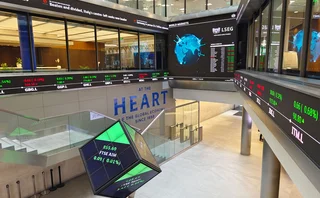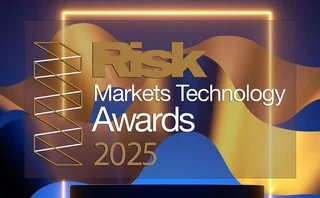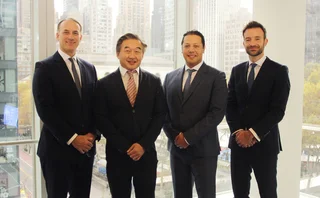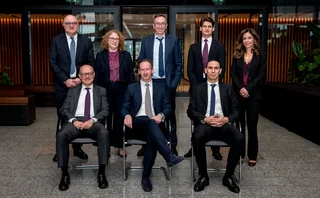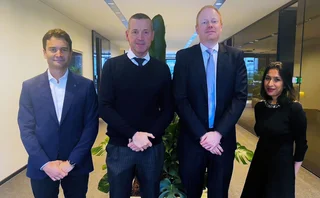
Natural gas/LNG house of the year: Engie
Energy Risk Awards 2021: In a volatile market Engie continued to grow its gas and asset management businesses

Despite volatility and uncertainty buffeting the gas markets in 2020, Engie continued offtaking and supplying gas at scale. As the third-largest natural gas importer in Europe and importer of 50% of consumption in France, Engie’s actions enabled firms to remain operational.
“In a volatile market shaken by the pandemic, we continued to be a reliable offtaker for our upstream clients’ production, thereby also ensuring all our downstream clients received the supply they needed,” says Sébastien Delannoy, head of gas assets & developments Europe, global energy management.
In these adverse conditions, Engie managed to grow its natural gas and liquefied natural gas (LNG) businesses, ink several pioneering deals and develop its innovative asset management services, all the while pursuing an aggressive green agenda that puts gas at the heart of the energy transition.
Notable deals included a medium-term North Sea natural gas offtake agreement signed with a gas producer client in 2020. With many North Sea oil and gas fields being decommissioned as supplies dwindle, offtakers are gradually withdrawing, making it hard for producers to sell. The client needed a reliable offtaker but also financing to develop fields nearby in order to continue production at its current level. The bespoke offtake contract Engie signed will yield an equivalent of 14 terrawatt hours (TWh) over five years, starting in 2022.
Under the deal, Engie purchases the gas from the client’s assets as-produced while offering services including logistics, capacity booking and balancing. “We take care of the entire process of getting the gas from the North Sea offshore pipeline system to gas networks and to consumers,” says Delannoy.
The deal includes an integrated hedge that saves the client having to manage its price risk with derivatives and pre-payment for certain gas deliveries to facilitate the maintenance of the asset.
Engie has also been involved in some short-term deals that deliver gas to clients at multiple sites around Europe while allowing them to trade the gas at a single hub of their choice. It signed a two-year contract with a global chemicals company that ensures virtual transport of 4.6TWh of gas overall from the TTF hub to the Zeebrugge Trading Point, with the volumes delivered to their Antwerp site in Belgium.
“These deals leverage our active presence on all the main European hubs. They are a game-changer for pan-European industrials seeking comprehensive and competitive integrated portfolio management services,” Delannoy says.
Meanwhile, Engie’s LNG business posted impressive results for 2020, trading 130 cargoes, increasing staff numbers by 30% and continuing to build its asset management portfolio, which consists of short- to medium-term positions covering all continents. Challenging conditions in Asia, where spot LNG prices more than quadrupled at the beginning of 2021, caused a series of credit issues at prominent Asian companies. Engie’s ability to quickly realign its commercial and risk strategies so that teams could support their clients, led to a 50% revenue increase on origination activities, the firm says.
Engie’s energy management solutions team also grew its presence, especially in Romania which is the springboard for its activities. Engie Romania now has 40% local gas market share and recorded 60% client base growth in 2020. It has more than 20 new clients to be onboarded by 2022 and 1.6TWh of gas under management, with 11TWh planned by 2022.
Overall, gas is a central part of Engie’s ambitions to support the transition to carbon-neutrality.
“We promote gas as the right transition backup to manage renewable intermittency and to replace dirtier fuels like coal and lignite,” says Delannoy. “In the meantime, we are also investing to further develop renewable and low-carbon gases on the way to achieve a net-zero carbon target by 2050.”
Engie’s global energy management team is exploring a number of projects relating to carbon-neutral LNG. The firm is also helping to develop small-scale LNG, signing its first such contract in November 2020 with a French firm to supply more than 150 gigawatt hours throughout 2021. This activity will enable clients such as off-grid industrials and transport companies to decarbonise by using low-carbon LNG as a fuel.
Engie is also active in the biomethane market. As well as two very early, ground-breaking deals in France and Belgium in 2020, Engie signed an agreement for an eight-year biomethane-based gas purchase agreement with a Spanish producer. Engie will offtake the entire production of a methanisation unit and also manage the associated renewable gas certificates. The firm now has a 50% market share of the French biomethane market and a yearly energy equivalent of 1TWh a year.
Another area of exploration for Engie is the low-carbon hydrogen market and here it has entered into a partnership with Equinor and set a target of reaching 3GW by 2030.
Demand is growing for tracing the origin of gas and proving its green credentials, and Engie is addressing this through its blockchain-based ‘TEO’ platform. In 2020 Engie signed a two-year contract with Swiss natural gas supplier Gaznat, providing for gas certificates of origin equivalent to 2.5TWh.
Only users who have a paid subscription or are part of a corporate subscription are able to print or copy content.
To access these options, along with all other subscription benefits, please contact info@risk.net or view our subscription options here: http://subscriptions.risk.net/subscribe
You are currently unable to print this content. Please contact info@risk.net to find out more.
You are currently unable to copy this content. Please contact info@risk.net to find out more.
Copyright Infopro Digital Limited. All rights reserved.
As outlined in our terms and conditions, https://www.infopro-digital.com/terms-and-conditions/subscriptions/ (point 2.4), printing is limited to a single copy.
If you would like to purchase additional rights please email info@risk.net
Copyright Infopro Digital Limited. All rights reserved.
You may share this content using our article tools. As outlined in our terms and conditions, https://www.infopro-digital.com/terms-and-conditions/subscriptions/ (clause 2.4), an Authorised User may only make one copy of the materials for their own personal use. You must also comply with the restrictions in clause 2.5.
If you would like to purchase additional rights please email info@risk.net
More on Awards
Clearing house of the year: LCH
Risk Awards 2025: LCH outshines rivals in its commitment to innovation and co-operation with clearing members
Best use of machine learning/AI: CompatibL
CompatibL’s groundbreaking use of LLMs for automated trade entry earned the Best use of machine learning/AI award at the 2025 Risk Markets Technology Awards, redefining speed and reliability in what-if analytics
Markets Technology Awards 2025 winners’ review
Vendors jockeying for position in this year’s MTAs, as banks and regulators take aim at counterparty blind spots
Equity derivatives house of the year: Bank of America
Risk Awards 2025: Bank gains plaudits – and profits – with enhanced product range, including new variants of short-vol structures and equity dispersion
Law firm of the year: Linklaters
Risk Awards 2025: Law firm’s work helped buttress markets for credit derivatives, clearing and digital assets
Derivatives house of the year: UBS
Risk Awards 2025: Mega-merger expected to add $1 billion to markets revenues, via 30 integration projects
Interest rate derivatives house of the year: JP Morgan
Risk Awards 2025: Steepener hedges and Spire novations helped clients navigate shifting rates regime
Currency derivatives house of the year: UBS
Risk Awards 2025: Access to wealth management client base helped Swiss bank to recycle volatility and provide accurate pricing for a range of FX structures

